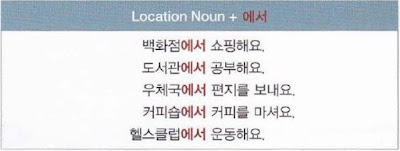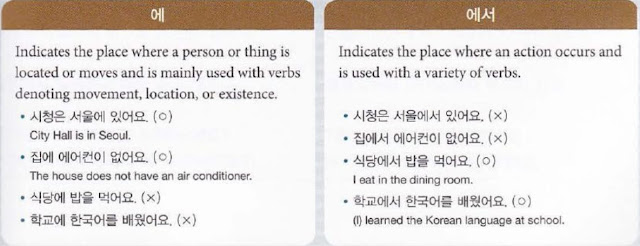 학교에 가요. 학교에서 공부를 해요,
학교에 가요. 학교에서 공부를 해요,
I’m going to school. I study at school.
극장에 갔어요. 극장에서 영화를 봤어요.
I went to the theater. I saw a movie at the theater.
식당에 갈 거예요. 식당에서 밥을 먹을 거예요.
I’m going to the cafeteria. I’ll eat at the cafeteria.
Grammar Focus:
에서 is added to the end of nouns to express the place at which some action or behavior occurs. It corresponds to ‘at’ or ‘in’ in English.
 Conversation:
Conversation:
A: 어디에서 살아요? Where do you live?
B: 서울에서 살아요. I live in Seoul.
A: 어제 뭐 했어요? What did you do yesterday?
B: 명동에서 친구를 만났어요. I met my friend at Myeong-dong.
A: 내일 뭐 할 거예요? What will you do tomorrow?
B: 도서관에서 공부할 거예요. I’ll study at the library.
When used before the verb 살다, the particles 에 and 에서 can both be used. There is very little difference in meaning.
• 저는 서울에 살아요. (〇) (Describes the state of living or existing in Seoul.)
• 저는 서울에서 살아요. (〇) (Emphasizes the act or behavior of living in Seoul.)
Comparison:

Click below:
N이/가
N은/는
N을/를
N와/과, N(이)랑, N하고
N의
N에 ①
N에 ②
N에서
N에서 N까지, N부터 N까지
N에게/한테
N도
N만
N밖에
N(으)로
N(이)나①
N(이)나 ②
N쯤
N처럼, N같이
N보다
N마다
